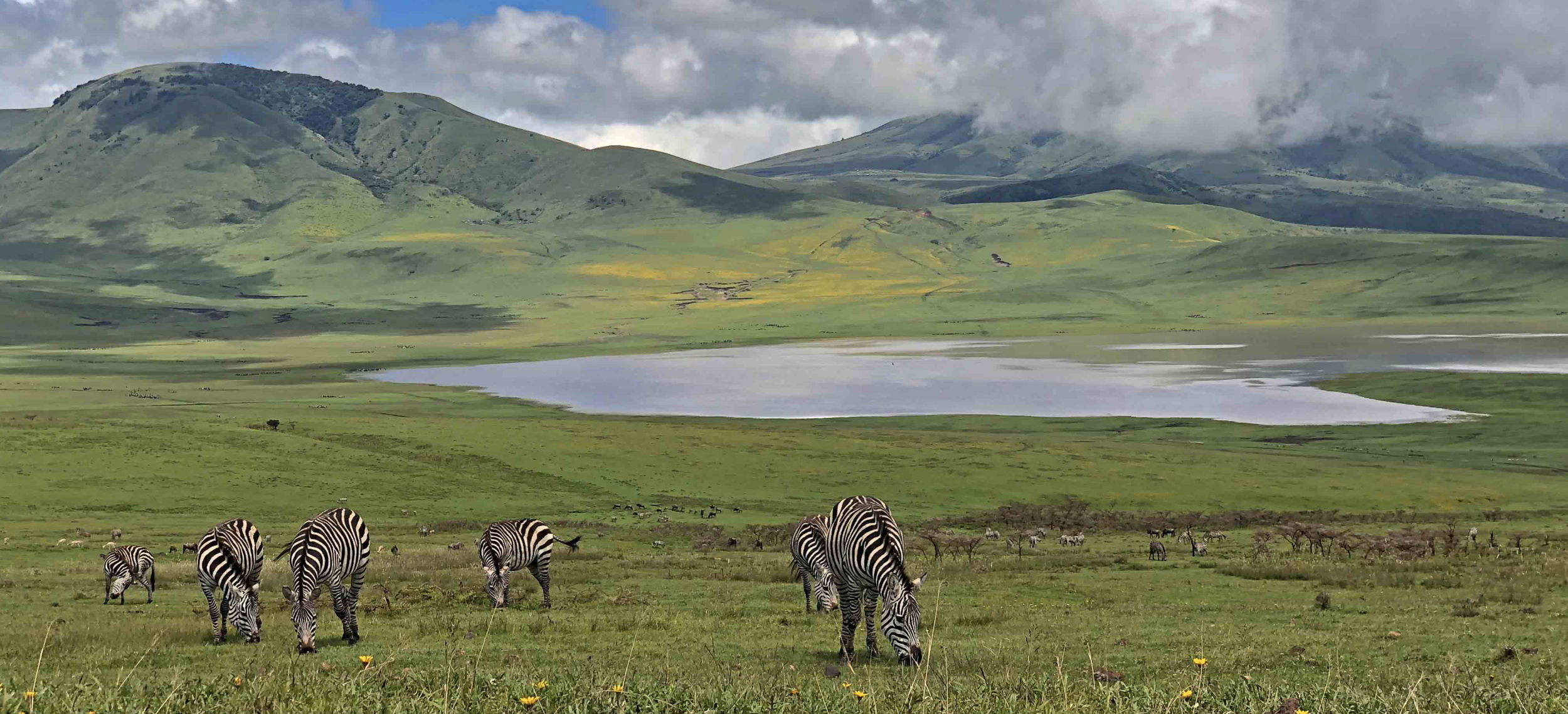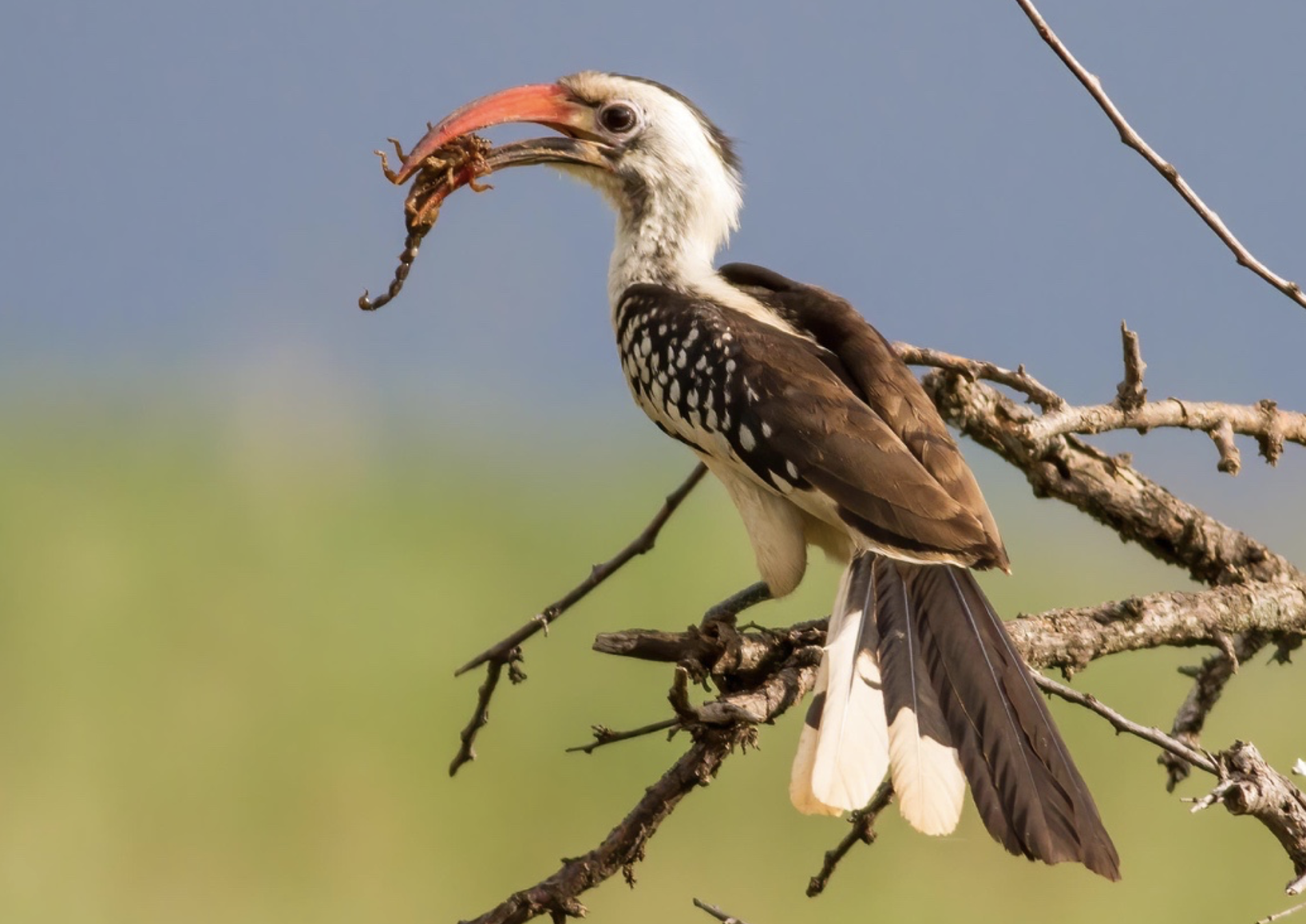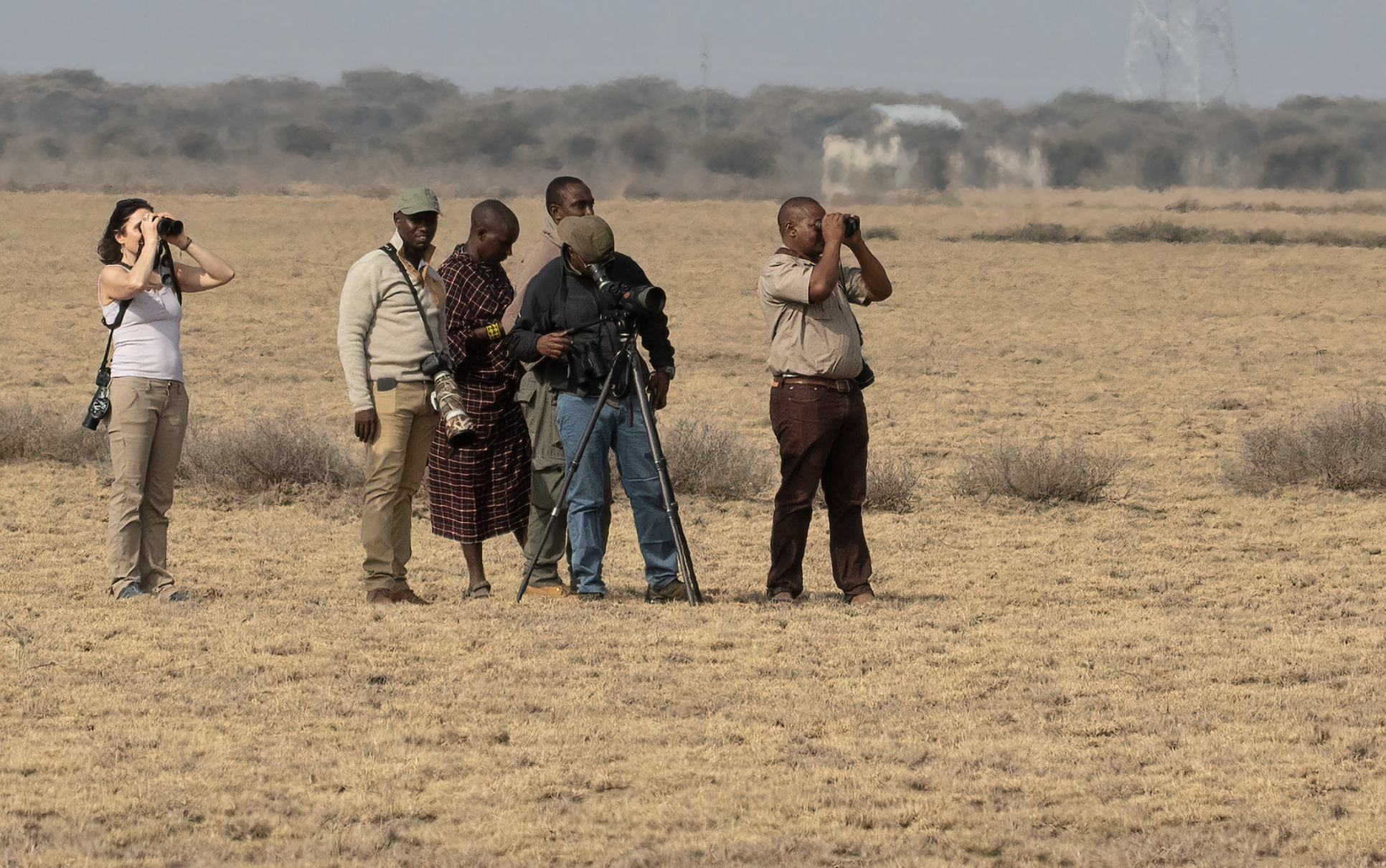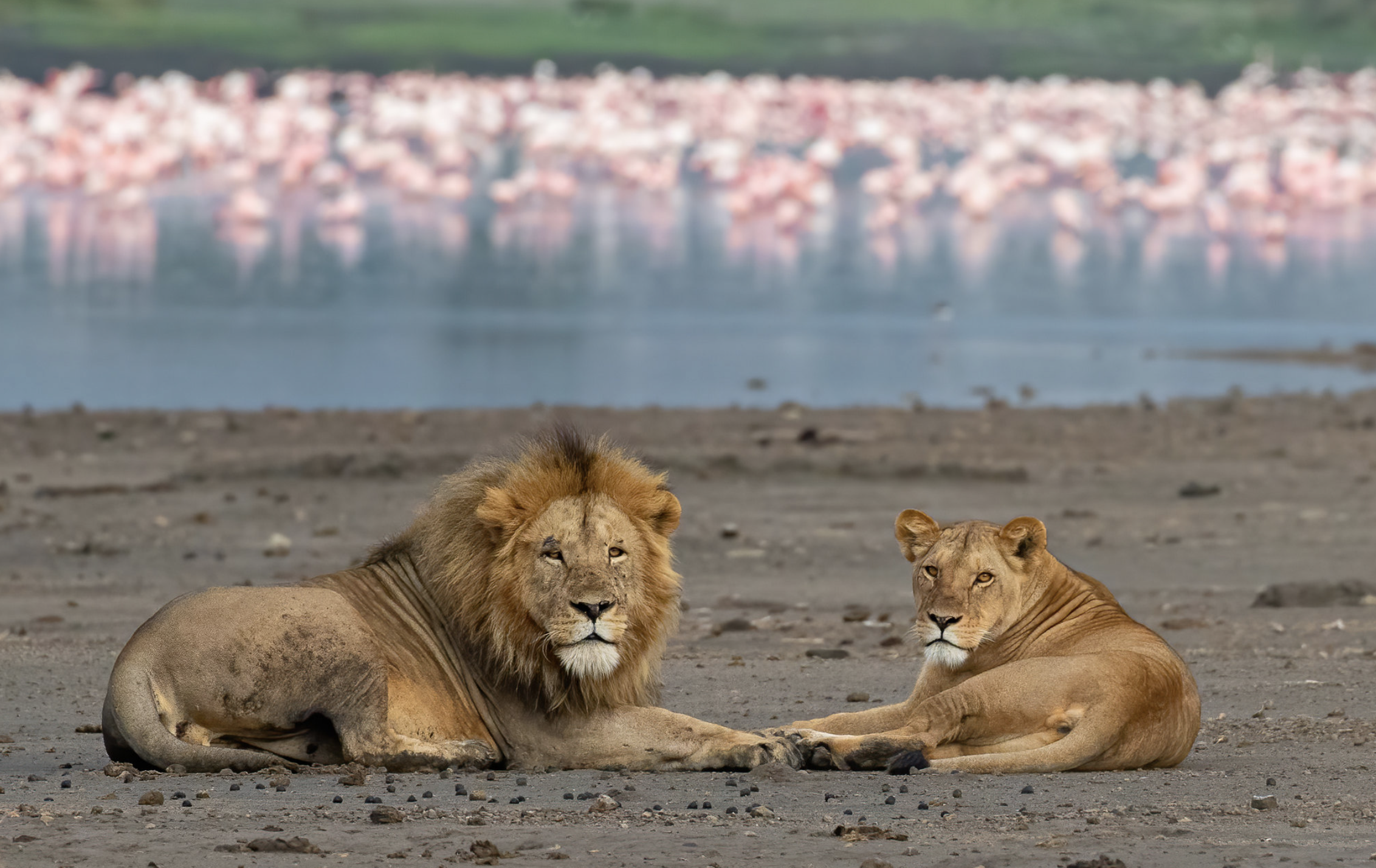
Tanzania
The Endless Plains & The Crater
SOLD OUT
March 31 - April 12, 2026
Leaders: Phil Chaon & Keneddy Elly
Top-notch Accommodations
Timed for The Great Migration & ~400 bird species
Superb safari jeeps, with open vehicle for Great Migration Areas
Perhaps best safari experience in the world
Equal time with animals & birds
Great for couples with a non-birding spouse, or a BFF trip
The ultimate safari, we touch four of Tanzania’s best known national parks, each brimming with birds & iconic wildlife. Big mammals and birds are our focus, on this trip to the “endless plains” of the Serengeti, and the otherworldly Ngorongoro Crater. We feast our eyes on elephants, big cats, giraffes, rhinos, as well as birds like Martial Eagle, Secretarybird, and Lilac-breasted Roller. Enjoy off-the-beaten-path spots too, with opportunities to learn about and from indigenous people.
See our eBird trip report and photo gallery here.
Red-billed Hornbill with scorpion in Tarangire National Park.
Daily Overview
PRICE & BOOKING INFO
Tour Price/person*: $9445
Deposit: $1000
Single supplement: $1185
Final Payment Due: 30 November 2025
*Based on double occupancy at lodgings, with a group size of a minimum of 4 to maximum of 6 registrants. Group also includes guide(s) and driver(s). If less than 4 registrants, trip may be cancelled or re-negotiated. Note that if you want a roommate we can try to find you one, but we cannot guarantee anyone a roommate, and if none is available, you will be charged the single supplement.
The tour price (fee) includes services from upon arrival on Day 1 into Arusha/Kilimanjaro International Airport (JRO) until our return there on Day 12, including:
· All meals from dinner on Day 1 through breakfast on Day 12.
· All accommodations from Day 1 through until Day 11.
· All transport from arrival into the Kilimanjaro Int. Airport (JRO) on Day 1 through to Day 12, until guests are transported back to JRO (usually mid to late afternoon).
· All guiding services, access permits and entrance fees to birding areas.
· Tips for drivers and staff at hotels and restaurants.
Excluded from your tour fee are:
· International flights.
· Alcoholic beverages, laundry services, charges for phone calls, and any other items of a personal nature.
· Expenses associated with travel such as visa fees, airport taxes, airline baggage fees, COVID tests, vaccinations, etc.
Documents
All travelers must have a current passport, valid for six months beyond the start date of this tour, with at least one blank page for visas. A visa is required of US citizens entering Tanzania, at a cost of $100. Proof of yellow fever vaccine is advisable.
Cancellation Policy
We strongly recommend all guests purchase travel insurance, including coverage for medical evacuation services and trip curtailment, in advance of this tour. It is important to protect against financial losses in the event that registrant becomes unable to participate in the tour. Note that such coverage is often non-refundable so please check with the Hillstar Nature team before purchasing it, to confirm the tour is to proceed as planned.
If a guest/participant cancels registration:
● 120 days or more prior to the start of the tour, a refund is issued minus a $500/person processing fee.
● Between 119 and 90 days prior to the start of the tour, half of the tour fee will be returned to the registrant.
● 89 days or less prior to departure, no refund of payments or deposits are issued.
The team at Hillstar Nature reserves the right to refuse service to any registrant/participant who acts disruptive or in a manner inconsistent with the goals of the tour. All guests are expected to comply with the rules and agenda set forth by the guide(s) of the tour, and to behave in a way that is considerate and conducive to a quality group experience.
Please contact us if you have any questions about if a tour is a good fit for your goals and/or level of fitness.
Pace, Rigor, Climate & Pests
● Relaxed pace. No rigorous hiking. Large animals dictate we remain in or near our vehicle.
● Comfortable or luxurious accommodations. Each a 1 or 2-night stay, as we cover ground to maximize chances to enjoy wildlife.
● Pleasant weather, with chance of high heat at times. Prepare for sun exposure at middle elevations (~3000-7000 feet).
● Biting insects are usually not prevalent, but are possible. At this season often nearly none, but there could be some mosquitoes and tsetse flies.
Our goals with this tour are to make a pleasing, relatively short circuit of the best birding and wildlife viewing areas of northern Tanzania; which happen to be among the best wildlife destinations on the planet. To accomplish this, we cover a good amount of ground, moving from one spot to the next usually after a couple nights at each location. There are few uninterrupted long drives and the pace each day is steady yet relaxed, with good time to enjoy birding, wildlife viewing, and casual photography. These are the priorities, while still allowing some time at our lodging each evening to enjoy a nice meal and to celebrate the days triumphs with a cocktail, or a choice dessert.
The general plan is to be out around sunrise, and to cover enough ground to give ourselves the best chance at seeing all the animals we want to see. Usually we aim to return to our lodging, or arrive there, near sunset. Night drives are not permitted in the areas we visit, so we maximize daylight, and rest at night. Accommodations vary between typical safari lodges, and tented camps in wilderness areas. We also enjoy mobile tented camping in the Serengeti, which allows us to be among the wildlife even as we rest. This is not something every visitor gets to experience.
Weather is generally stable at this season and we expect it to be pleasant or warm, though it could be hot at times. Usually daytime temperatures are in the 60s-80s F, but could crest higher conceivably. We recommend having a light waterproof (or strongly water-resistant) layer to go over a fleece that help with rain and if it gets chilly. A hat, sunglasses, sunscreen and long sleeves help protect you against sun exposure.
Biting insects are usually not an issue here, but on occasion mosquitoes or tsetse flies could be around and active. Long sleeves (multiple light layers) help protect against these, along with repellant. A buff or lightweight neck gaiter can help against bugs (or dust), and a head-net adds further protection. We do not expect many biting insects at this season, but it is possible to encounter them, none the less.
Consult your physician for latest information on vaccinations before entering Tanzania. Proof of Yellow Fever vaccine is usually recommended and many travelers opt for malaria prophylaxis (e.g. malarone). We strongly urge guests to consult a doctor about vaccinations and medications prior to travel.
Packing
Please limit yourself to one mid-size suitcase/duffel and another smaller bag (daypack, small backpack or the like) for daily use on outings. Group travel dictates we consider our fellow traveler’s comfort, and this includes not over-packing. With pleasant temperatures and laundry services available along the way, there is little need for more than a couple changes of clothes. Having lightweight clothes than can be hand-cleaned can be an advantage. Also, there is essentially no hiking, and almost all birding is from in/near the vehicle which means that a pair of trail shoes, and maybe a comfortable pair of shoes for around the lodgings is about all that’s required.
Lightweight clothing that is easy to layer is best. We could encounter some mist or rain, and perhaps some wind or a chilly evening or two. Lightweight raingear is recommended along with perhaps a fleece, and/or a thermal layer for if it cools off at night. Neutral colors are best. A buff (lightweight neck-warmer) for use as breathing barrier or for warmth can be helpful. Sunscreen, hat and sunglasses are good for time spent in prolonged sun, where tree cover is scant. We are often 4000-5000 feet above sea level, which isn’t really high enough for the air to thin for low-landers, but is enough for some to get sunburned easily.
Power outlets in Tanzania are type G most often or type D (230V/50Hz). Wi-Fi is offered at most lodgings but subject to disruption at times.
View Hillstar Nature’s Terms & Conditions of Booking















